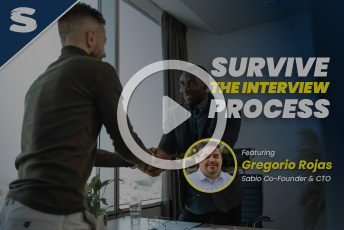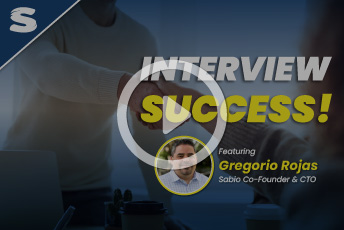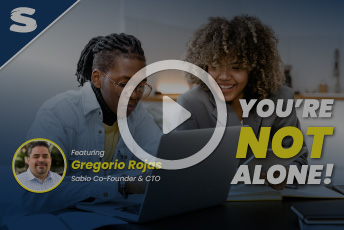Now Reading
Imposter Syndrome: The Interview Process
Friday, December 3, 2021
How to fight off Impostor Syndrome during a job interview with these simple techniques. Brought to you by Sabio Co-Founder Gregorio Rojas.
How to fight off Impostor Syndrome during a job interview with these simple techniques. Brought to you by Sabio Co-Founder Gregorio Rojas.
Hello, my name is Gregorio Rojas. I am one of the co founders of Sabio, also the head instructor at Sabio developer bootcamp, run out of Los Angeles in Irvine, California. This is another video in our series of videos about imposter syndrome and and how to inoculate yourself against imposter syndrome. And how do you do that? You do that by asking questions and you ask questions, even when they're tough questions, even when it's a tough time in, it's important to ask these questions, questions like these? When is the scariest time to ask the questions? And so this question is also about the interview process, interview process, what happens at interviews, and the kinds of questions that you're going to find that are really empowering and reassuring to yourself, as you're going through a process where people are judging you, and judging whether or not you have the appropriate skill set, to be a software developer, to be a senior software developer, to get that raise, to get a promotion to move up within an organization. And so here's another story about what another woman in a developer faced in their interview process. And so if you've never been through the interview process that can take many forms, it could be one person rapid fire questions at you, it could be you whiteboarding in front of one person, it could be you whiteboarding, answering rapid fire questions in front of a panel of people, maybe they take turns two people at a time, two, three hours, they can take many forms, one of the forms that they contain, is that they can give you a problem to solve live in front of them, right. So sometimes in front of a computer, sometimes it will be just something that you have to whiteboard. And so one of our developers was giving me a problem to solve live in front of a developer right in front of a developer live here, go fix this problem, provide a solution for this problem. Now, unfortunately, she couldn't, she couldn't do it. Wait, which, by the way, it's not that hard to take someone in a room, under these circumstances, given them a question that they could problem solve, if they were just sitting quietly in front of their computer. But somehow, you know, the interviewer, you get nervous, you get a little rattled, the person in front of you might be a little intimidating. You might have just had a bad morning, they might have had bad morning, it's not that hard to get something wrong in an interview. And it's also not that hard that when you get something wrong in an interview, for you to let it affect you in such a way that the whole interview just gets away from you. You lose your mind, you start spiraling out of control. Right? It's happened to me, right? I mean, it happens, it happens to everybody. And so that's not necessarily a bad thing that you would find yourself in a situation where you cannot provide an answer to a solution. Let me tell you that right up there just happens to everybody. But here's the rule thing that I never thought to do myself, is that when presented with this situation, when she found herself like, Look, I can't do this for you. She asked him to do it for her. All right, show me show me the answer to this situation, you know, make this thing run. And it was here, it was a really great thing. It was something that you could run, it wasn't just a theoretical thing, like, Oh, let me just like write some variables up here. And this is a would work, trust me this would work. This was actually something that you could run. He couldn't do it. So here's a person that not only I mean, it's one thing to walk into an interview room, not know what someone's gonna ask you and not be able to get the answer. But how about being the interviewer having knowing what question, what problem, what chunk of code, you're going to present to a person as they come in and interview for your company? Walking into that room? Knowing the question, probably being an author of it, deciding whether or not this was a good question or not. And then not being able to provide the solution yourself. There's no pressure, you knew the answer ahead of time, you should have known the answer ahead of time. He knew the question ahead of time. And you still can't answer this question. And it's based on this question that you're going to judge whether or not that developer is going to get a job, right? This is how you're going to be judged. So this is really important, right? So anytime you find yourself in that situation, don't feel like you can't ask, Can you help me? What would that answer do so nicely? Do so professionally? Because you will find that many people across from the table will be very nice. And as long as the question and the answer doesn't take up the whole interview. Most people will help you out and try to point you in the right direction. And you know then there's these people whom will not be able to even provide an answer for you, they the guy that was nice enough to try. So that I'll say that for them. But in my opinion, why are you going to ask me this question and then judge my potential employment, opportunity to hear based upon something that you invest in this building? Can't do yourself, right. And so I take from this, the idea that, you know, sometimes the interview process is not fair. It's not fair, it's not appropriate. It's not actually a true reflection about what they do behind the scenes, even when the question is known ahead of time, even though when the problem is known ahead of time, they still can't do what they're asking you to do. Right. And so it's a little bit of this hypocrisy that exists a lot in the interview process, because the stuff that they asked you about the stuff that they want you to have done and stuff that they don't know, and stuff that they don't put in practice. It's something that's not part of their software development lifecycle, anyway, right. So take that and find opportunities that when you go to an interview, it's not just them that is interviewing you. You're interviewing them as well, right? So remember that when you're going through an interview process and know that the people in front of you are also there to answer your questions. When you leave, anything's possible. When you come here, you want to stay.
During our Info Sessions you will learn all about our program, and also get to speak with Sabio team members. In addition, every week you get to hear directly from recent grads that are now thriving in tech.

Sabio Info Session

Info Sessions are your chance to meet our instructors via Zoom and to get an overview
of what Sabio and Alliant International University have to offer from our innovative program.
It’s a warm environment where you can ask questions and get over any fears or hesitancy you
may be experiencing.
*All times are PDT/PST






